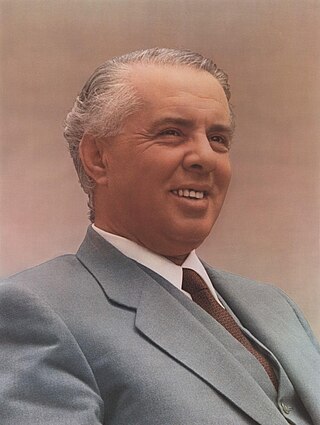
Enver Hoxha was an Albanian communist politician who was the ruler of Albania from 1944 until his death in 1985. He was the First Secretary of the Party of Labour of Albania from 1941 until his death, a member of its Politburo, chairman of the Democratic Front of Albania, and commander-in-chief of the Albanian People's Army. He was the twenty-second prime minister of Albania from 1944 to 1954 and at various times was both foreign minister and defence minister of the country.

The Party of Labour of Albania (PLA), also referred to as the Albanian Workers' Party (AWP), was the ruling and sole legal party of Albania during the communist period (1945–1991). It was founded on 8 November 1941 as the Communist Party of Albania but changed its name in 1948 following a recommendation by Joseph Stalin. The party was dissolved on 13 June 1991 and succeeded by the Socialist Party of Albania and the new Communist Party of Albania. For most of its existence, the party was dominated by its First Secretary, Enver Hoxha, who was also the de facto leader of Albania from 1944 until his death in 1985.

Koçi Xoxe was an Albanian politician who served as Deputy Prime Minister and Minister of the Interior of the People's Socialist Republic of Albania. He was supported by Yugoslav leader Josip Broz Tito during efforts to bring Albania into the Yugoslav federation. After Albania's leader, Enver Hoxha, established the country's independence with the support of the Soviet Union, Xoxe was arrested, tortured and executed.
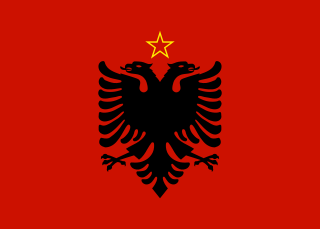
The People's Socialist Republic of Albania, officially the People's Republic of Albania from 1946 until 1976, and from 1991 to 1992 as the Republic of Albania, was the communist state in Albania from 1946 to 1991. It succeeded the Democratic Government of Albania (1944–1946).

Beqir Balluku was an Albanian politician, military leader, and Minister of Defense of Albania. Balluku assisted Enver Hoxha in carrying out the 1956 purge within the Party of Labour. However, in 1974, Balluku himself, along with a group of other government members was accused by Hoxha of an attempted coup d'état against the Albanian People's Republic. He was executed the next year.

Teme Sejko was an Albanian Rear Admiral and commander of the Albanian navy and the naval base of Durrës. In 1961 he was executed for allegedly being the leader of a pro-Soviet group that had been planning a coup d'état against Enver Hoxha by selling the Albanian Navy to the United States Sixth Fleet.
Tahir Demi (1919–1961) was an Albanian politician. He was high-ranking member of the Party of Labour of Albania and representative of Albania at Comecon. In 1960 he was arrested and sentenced to death in 1961 for being a member of a pro-Soviet group, led by Rear Admiral Teme Sejko, that had been planning a coup d'état against Enver Hoxha.

Hysni Kapo (1915–1979) was an Albanian military commander and leading member of the Party of Labour of Albania. A member of the Communist Youth group, Kapo was first distinguished as an artillery commander in the Battle of Drashovica. In 1941 he was elected as a representative of the Youth group in the provisional central committee of the party and from 1956 until his death in 1979, he served as secretary of the central committee of the labour party. Hysni Kapo served in many ministerial positions and was a member of the Politburo of the Party of Labour of Albania from 1948 to his death. In the 1960s he played an important role in the emancipation of women in Albania during the cultural revolution of the era, and is remembered as a trusted man of the Albanian communist leader Enver Hoxha.
The Albanian–Soviet split was the gradual worsening of relations between the Union of Soviet Socialist Republics (USSR) and the People's Republic of Albania, which occurred in the 1956–1961 period as a result of Soviet leader Nikita Khrushchev's rapprochement with Yugoslavia along with his "Secret Speech" and subsequent de-Stalinization, including efforts to extend these policies into Albania as was occurring in other Eastern Bloc states at the time.
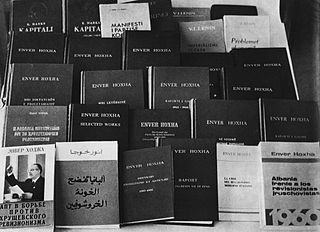
Hoxhaism is a variant of anti-revisionist Marxism–Leninism that developed in the late 1970s due to a split in the anti-revisionist movement, appearing after the ideological dispute between the Chinese Communist Party and the Party of Labour of Albania in 1978. The ideology is named after Enver Hoxha, First Secretary of the Party of Labour from 1941 to 1985 and leader of Albania from 1944 to 1985.

Ramize Gjebrea was an Albanian World War II partisan, accused of alleged immoral behavior by a martial court, and executed by a firing squad in the village of Ramicë, Vlorë.
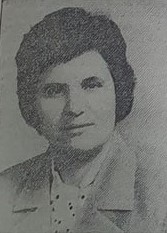
Lenka Çuko is an Albanian former politician of the Albanian Party of Labour (PPSh).

Athanas Spiru, known as Nako Spiru, was an Albanian politician and high-ranking official of the Communist Party of Albania (PKSh). He served as Minister of Economy and Industry from 1946 until his untimely death the following year.

Xhafer Spahiu was an Albanian politician of the Albanian Party of Labour (PPSh). He was the only Kosovar Albanian of the higher ranks of the Communist Albania leadership after 1948.

Fiqrete Shehu was an Albanian politician during the Communist Era. She was the wife of former Prime Minister Mehmet Shehu.

Zef Mala was an Albanian publicist and early communist. He was the leader of the Communist Group of Shkodër.
Riza Dani (1887–1949) was an Albanian politician and activist of the 20th century.
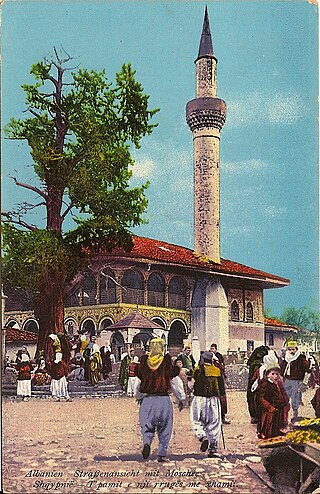
The Old Mosque or Sulejman Pasha mosque was the founding mosque of the Albanian capital Tirana. The city developed around the mosque, which was founded by the Ottoman Albanian Pasha Sulejman Bargjini along with a hammam and a bakery. In the mid of the 20th century, all of it was razed to make place for the Communist-era Unknown Soldier statue.

Naxhije Dume was an Albanian politician. She was one of the first group of female members of the Albanian parliament and the first female minister, serving briefly as Minister of Education in 1948.
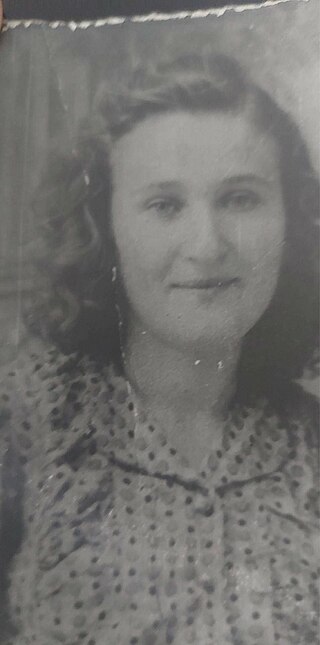
Sofia Noti (1925–1944) was an Albanian World War II freedom fighter and a national martyr. A nurse, she was captured as a POW, and then hanged by the Nazi forces in the concentration camp Pavlou Mela, in Thessaloniki, Greece.


















